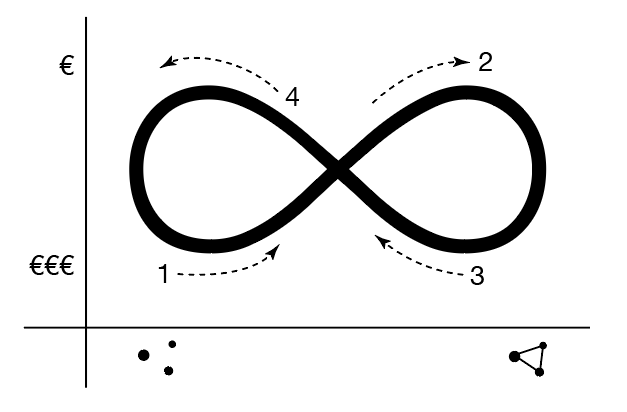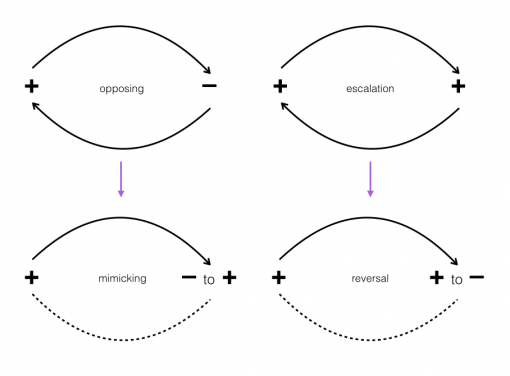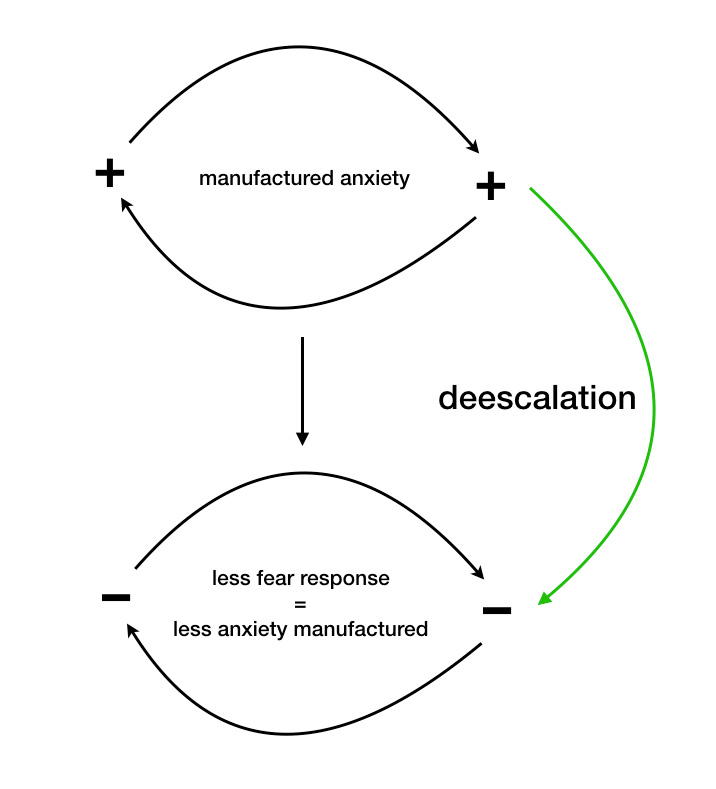Coronavirus as a Sociopolitical Exploitation Mechanism
by Dmitry Paranyushkin
The virus is not as dangerous as the the parasites that come with it.
It’s clear that the current Coronavirus crisis is actively shaping the new version of the world that will never be the same as before.
Conspiracy theories aside, the virus created a fertile ground for any disruptive force to take advantage of the cracks and crevices in the system, to destabilize, and to take control. While it is unlikely that the virus was purposefully created, there are many forces, right at this very moment, which are already using the current situation to their benefit. Just like the parasites that use a weakened immune system to enter the body.
This article will use EightOS methodology to reveal the vulnerabilities that this virus exposes and the various strategies of infiltration, destabilization and control that could be implemented as a result.
A better understanding of this dynamics can help form an appropriate response. This response can take different shapes, depending on the objective: from self-immunization and mitigation of personal risks, to taking the opportunity to advance a sociopolitical and economical transformation in the system.
We will purposefully focus on the macroscopic scale — the sociopolitical implications of the virus, its effects of the body and mind, the biopolitics it promotes, and the accompanying “infodemic” — because this is what we can respond to immediately. The microscopic scale — that is, a set of strategies the virus uses to hijack and exploit cells — is equally interesting, but its pragmatic potential is less urgent in the context of EightOS practice. There are multiple parallels between the way the virus affects the body on the cellular level and the way it affects the society at large and we will will explore them in this analysis.
Step 1: Exposing Vulnerabilities
The most efficient attack rarely goes straight for its objective. Rather, the first incoming impulse is usually delivered to test the system and to exploit the most vulnerable parts, which become the actual targets for the subsequent attacks.
The virus itself is not as destructive as it could have been. However, it revealed numerous vulnerabilities in the system, which may (and probably will) be exploited:
- Inadequate healthcare
Hospitals rarely cope well: constant queues, high bills and accidentally dead patients have always been always a norm, but it has now come to the public attention. - Overreactive politics
Politicians will prefer to overreact to disclaim any responsibility. It is much easier to be blamed to doing too much than too little. The short-term consequences matter more than the long-term ones due to the current accountability procedures and reelection cycles. - Moral authoritarianism
It turned out that under the guise of moral authority and solidarity most people are willing to impose a certain social order onto others, even if it has to be done violently or using the rule of law. - Sensationalist media
Media is feeding onto attention and reproduces the content that gets more clicks. This establishes a feedback cycle where fear-inducing content gets published more often and proliferated further by social media in echo chambers. - Fear of death
Most societies are not ready to deal with death, usher it away, or treat it as a disease that should be get rid of. As a result, when the death comes unexpected, the fear circuit is initiated — and with it — the natural “flight or freeze” response. We become immobilized or prefer to withdraw — and thus, more easily attacked or controlled. - Poor mathematical intuition
The numbers of deaths are flowing in, but we don’t know the real context (how many people die daily normally? did they have underlying conditions? what’s the real rate of infected?) Decisions are being taken based on incomplete data thanks to mediatization of suffering (all these trucks with dead bodies in Italy) and our fear of death — not on the real data. This shows that everything that is new and exponential in nature has the capacity to rid human kind of any capacity to reason and so that will be exploited in the years to come. - Suffering solidarity
“We are all in this together”, so anyone who refuses to suffer or to do it in the same way as others is ostracised and marginalized as an irresponsible member of society. This opens multiple possibilities for using this narrative to impose a kind of social order where the lowest common denominator becomes the accepted norm and any striving to transcend your condition is frowned upon as an anti-social act.
No matter what the outcome of this crisis will be, it’s clear that it’s not the last one. The world has now revealed multiple weaknesses which may be exploited by those who seek to destabilize and control.
Step 2: Infiltration — Entering Inside the Physical and the Sociopolitical Body
After the first step of exposing the vulnerabilities is accomplished, the virus — or the forces that are using it to their advantage (let’s call them “parasites”) — can take the next steps to infiltrate deep into our system (socially, politically, physically) and to exploit these vulnerabilities.
Tendency 1: Internalization of Control
If 9/11 was about bringing control to the surface of the body (airport scans, racial profiling) then Coronavirus is about injecting this control inside the body (temperature checks, obligatory immunisation, virus tests, RFA chips, etc)
Tendency 2: Decentralization of Control
Another tendency — in line with the modern times — is the decentralization of control, outsourcing it to the citizens themselves. It’s not anymore the task of the control apparatus to suppress its citizens. Rather, it is the task of the citizens themselves: both in relation to themselves and to the others.
Interestingly, these tendencies are reminiscent of the strategies used by the virus to hijack the living cells and to utilize living organism’s own forces to enter into the body and to disseminate its code.
However, if the purpose of the physical virus is to simply procreate, the purpose of infodemic may be hiding beyond the immediate surface.
It can be used as a trojan horse to bring in the narratives that would never be accepted under the “normal” circumstances:
- Control and surveillance for “your own safety”
Who could imagine just 3 months ago that European citizens would demand to be locked up, quarantined, and appeal to the strong powerful hand of the “big brother” to protect them from themselves? In this context it’s much easier to set up ubiquitous measures of total control and roll out the infrastructure needed for surveillance and this is already being implemented in many countries. - Exceptional state is the new norm
Many governments used the crisis to usher through various laws that give them exceptional powers without the need to consult with the parliament or the public. - Xenophobia
Who could imagine that the majority would agree to the total border shutdown: the dream of the local nationalists and right-wing forces? - The financial crisis could not have been prevented
We have long heard about the impeding financial crisis caused by inept credit policies, overspending, and uncurbed debt. The virus created a great opportunity to create a convincing narrative that the financial crisis rose as a result of the lockdown (which was necessary for your own safety) rather than systemic failures. - Terrorism out, pandemism in
In 2020 it became clear that a virus and the ensuing pandemic are much more efficient than terrorism. Expect the new kind of bio-terrorism, which will take full advantage of the vulnerabilities exposed in the system. - Delegate responsibility as it is good for you
Surpisingly, most people don’t even care about being locked up and limited in their movement. They find it comforting to be told what to do and how to behave. To delegate the responsibility for your life to politicians and experts is a safe choice as you don’t have to carry responsibility for any consequences. And many people will happily follow this narrative. - Digital is the future
The social networks, AI and VR don’t seem so frightening anymore. In fact, they enable us to connect from the safety of our comfortable prison cells. Singularity is nearer than ever before, fuelled by ubiquitous 5G and the internet of things. Making it much easier to accept digital control and the benevolent governing AI intellect of the future.
Ironically, these very narratives can be used both to support the new coming world order and to disrupt it.
Step 3: Destabilization
Once the vulnerabilities are exploited and the infiltration occurred, what happens next?
The virus itself may activate directly, however, the parasites that used it to enter the system may actually choose to wait for a moment of weakness to activate their agendas.
While the only agenda of a virus is to propagate, parasite organisms may have multiple objectives. Their best-case scenario is to weaken the host, so that their immune system cannot fight back and to feed off its resources while allowing the host to survive. They can achieve this through destabilizing the physical / sociopolitical body but only to the extent that’s needed to make it impossible to respond but possible to survive.
There are multiple destabilization strategies that can take place:
- Nocebo effect
Just like there is a proven effect of placebo, there is also a proven effect of nocebo. The more we believe that we’re going to get bad, the higher are the chances of it happening. Negative expectations and stress weaken the immune system, making it easier for the virus to come back. - Anxiety-driven panic destabilization
Most of the people are already anxious and full of panic. This makes them easily controllable, because they become a herd. Another outbreak (pandemic or infodemic) will awaken the herd instinct again. Interestingly, this is very similar to overreaction of the body (allergy) where overzealous cells are responding too strongly to the external impulse - Centralization of governance.
The governments have now pushed through the laws that make it possible to introduce exceptional states without consulting the public. This makes them more centralized and, thus, more unstable and prone to external influence. Any other provocation could be used to close down the borders, bring down economies, instil fascist-like regimes, destabilize the political systems. It’s not a question of whether it will happen again but when. - Exposing ethical contradictions
The western world is going through a huge crisis: its population is getting older. This poses a huge toll on the national financial systems. In order to keep the pension payments in place both the productivity or the taxes have to be raised (supporting the neoliberal mantra of constant growth). The virus has the highest impact on the elderly and it is largely to protect them that the further measures have now been taken that will have even more detrimental impact on the economy and on the ability to support those same people these measures were trying to protect. Most western countries will have to face a very difficult moral dilemma at some point and this will surely be exploited by internal and external forces who will seek to destabilize societies and political systems. - Increased borrowing and deeper debt cycles.
In order to pay for the economic consequences of the lockdowns all the affected countries will have to borrow the money on the external markets. Money are usually lent under a certain percentage, which, in turn, pushes the borrower towards the economic model of the constant growth. Therefore capitalism will further tighten its grip on societies. The only way to deal with it will be to shift to a highly technocratic model with hyper-productivity: meaning most labor shifting to the AI and machines, all the irrelevant workers getting the basic universal income to support their existence. The whole operation will be financed by money from China, which, as it looks now, will have the highest growth rate in the world. Therefore, effectively, China will buy the European and American debt and will be benefitting from the structural changes strengthening its own position. Time to learn Chinese!
These strategies may be the real objective of the “parasites” that will utilize the current virus crisis to push through their agendas. It is important, therefore, to prevent this from happening, both on the personal and political levels.
The procedure above is very reminiscent of what we present as the destabilization procedure in EightOS: allowing the first impulse to happen (self-inflicted infection), then shifting the common center elsewhere in that system, moving towards that center with one’s own core, taking control of the system as a result.
The video below demonstrates this procedure using the body-movement as a visualization technique to make it less abstract and more tangible. It can also be used as a personal strategy to respond to a similar kind of attack:
Strategies in Response to the Vulnerabilities
While the situation outlined above is pretty bleak, there are multiple personal strategies that can be followed in order to adapt to the changing order of things to come.
Any resilient and robust system is based on:
– Modularity (independent, but interconnected parts)
– Plasticity (can adapt its shape if needed to keep the original function intact)
– Redundance (having several options, hedging the bets)
The principles above can be translated into personal strategies, which can be scaled to any realm: from the personal physical body to the interaction with the environment
1. Assimilation
First comes the notion of assimilation or acceptance. If we cannot escape or fight back the impact, we simply accept that it’s happening. Letting it enter into our system. Observing the effects on our (collective) bodies and psyche. In a radical way this would also mean not being afraid to be infected. The evidence suggests that Coronavirus is going to become a seasonal occurrence and that 70% have to go through this anyway. So why not accept it now? This way the immune system can train before a more powerful update of Coronavirus strain comes out. We don’t know the consequences but these consequences are likely to stay the same even if we wait out and hide, and the consequences of a vaccine (which can also be seen as a strategy of mild assimilation) are even less known in this case.
The same applies to the socio-economical aspect. We will never know if the new world order is detrimental to us if we don’t try. And after we let the incoming impulse into our system, we can use its own strategies to circumvent the flow in the direction that may be more appropriate for ourselves.
2. Isolation and Diversification
At the same time, we should not let the impact spread into our whole body and mind. The principle of modularity means that we don’t let the impact affect our whole body.
Modularity is created through diversification. On the level of the body — training the body parts to be connected but independent from one another. On the social level — belonging to several self-sustainable groups and infrastructures, knowing how to be autonomous. On the political level — having several residencies or citizenships. On the economical level — spreading your resources and sources of income across different entities. And while protecting the most vulnerable parts (physically, psychologically, socially, economically) we have to leave some parts free and unaffected. This will happen anyway. There’s always an opportunity. And it is from those parts that we can find the energy to regroup and reposition ourselves, to find the integrity and the power to respond.
That’s why a complete freeze will only aggravate the consequences. We have to keep moving. Finding the new openings that emerge as a result of this situation and creating the new (human) connections that haven’t been made before, cutting the old ones.

3. Redirection
The idea of assimilation does not mean to fully take the impact within. We let it in to study its intention and impact and — most importantly — to resonate with the dynamics of what is happening in order to be able to influence its flow. Just like our immune system does, when it is healthy. Not overreacting, not fully giving in, but, rather exploring the possibilities we have left at this point. These possibilities depend on the direction we want to take. For instance, this may be a good opportunity to explore the alternatives: from the Chinese medicine and healthier lifestyles to luxury automated communism and autonomous communes.
Redirection means going along the flow but introducing a slight deviation to it. Using the incoming force to propose a direction. Digital economy? Yes, and maybe with a strain of diversity never seen before. Surveillance and control? Ok, but maybe we can also apply it back to the government and add strict accountability into the mix?
Do we just want to get rid of the virus? Do we want to learn from it? Do we want to be transformed by it? Do we want take the direction that it proposes? These are all questions that everyone needs to answer for themselves. The most dangerous thing is to give an answer automatically, to accept something as a universal truth. It is even more dangerous to start imposing this truth onto others under the pretext of common good: this is the beginning of totalitarianism.
4. Transformation
Once we join the flow and choose the direction, we can gradually start steering the flow to the direction we want it to take.
One option could be to totally open up to the infection in order to let the body fight it off and create immunity (thus reducing your danger to others). This approach is the subversion of the feedback loop we find ourselves in. Rather than opposing the domination, we submit ourselves to it but we exaggerate our submission so as to provoke a short-circuit in the feedback loop itself. When something with an intent to dominate experiences the level of submission which is highly exaggerated, it will have to relieve its pressure eventually (politically this is reminiscent of the accelerationism approach)
That’s where the control can be taken over (by the immune system or by an individual if we talk about the sociopolitical aspect). For a healthy person with no preexisting conditions (vulnerabilities) the statistics is pretty good: almost 60-75% do not experience any symptoms at all and for the majority of those who do the whole process is not so much different than the flu. The level of danger is also, probabilistically, not so much higher than what we live in already. This is, of course, not at all to be considered as a medical advice, as an endorsement, or as a recommendation. Rather, it’s one possible outcome out of many given the data we currently have.

It is important to say, however, that belief plays an important role in the process.
Everybody knows about the placebo effect and how effective it is, so that it’s always used in the medical studies to measure efficiency of a new treatment. Nocebo effect is the opposite.
If we engage into a self-reinforcing feedback loop narrative based on collective anxiety, helplessness, and fear, we reduce our chances to come out from this situation weaker than before (or dead). That’s why it’s so important to keep the spirits up and to believe in yourself and into what you are doing. This brings us to the spiritual aspect of transformation and the capacity it has to affect us all on a level much more profound than any virus ever can.

On the internet people come and go but we like to stay in touch. Please, join our Facebook group and sign up to our newsletter:
Stay in Touch
On the internet people come and go but we like to stay in touch. Please, subscribe to our newsletter to be informed about our live and online events as well as the new publications:



